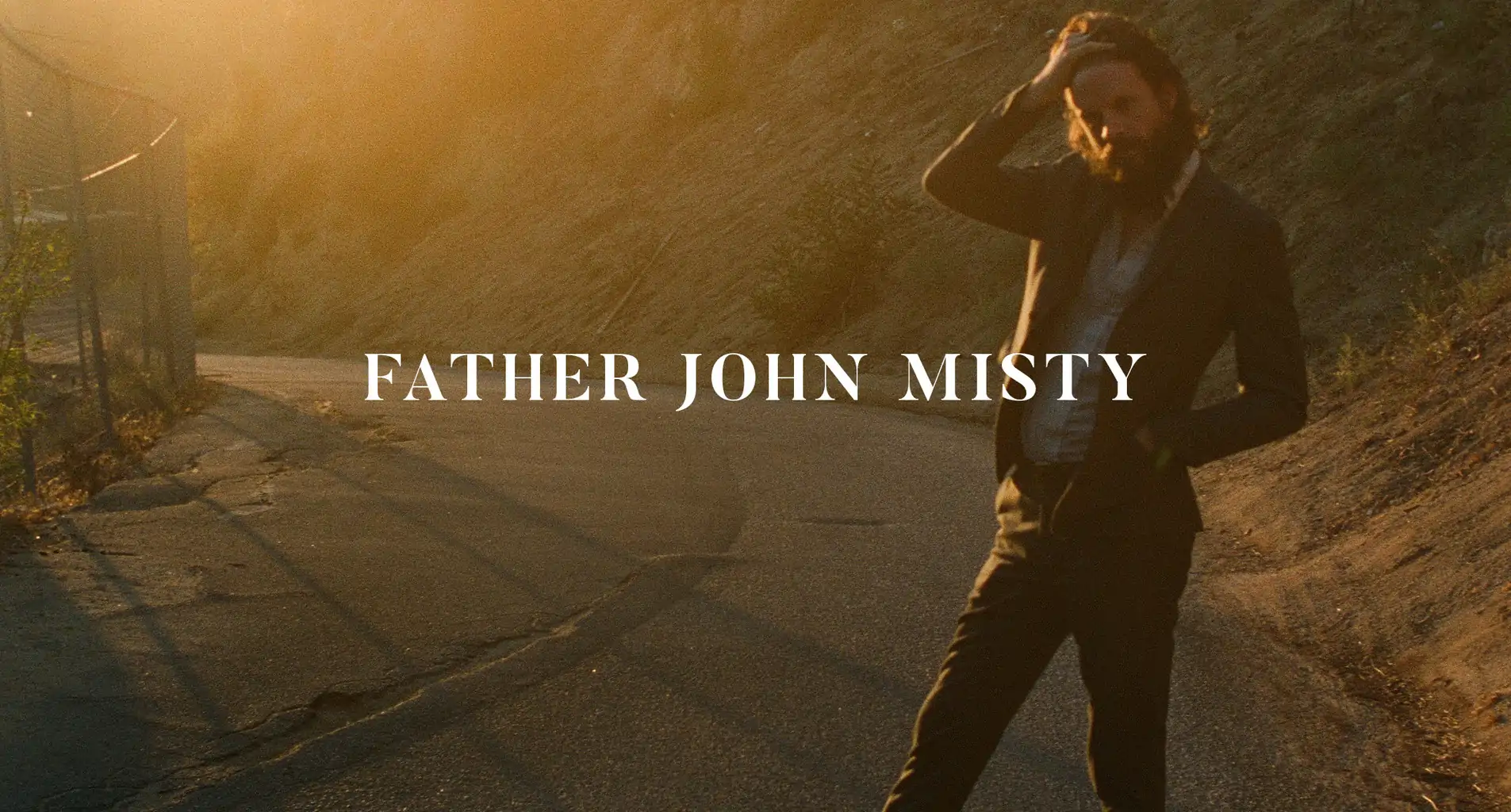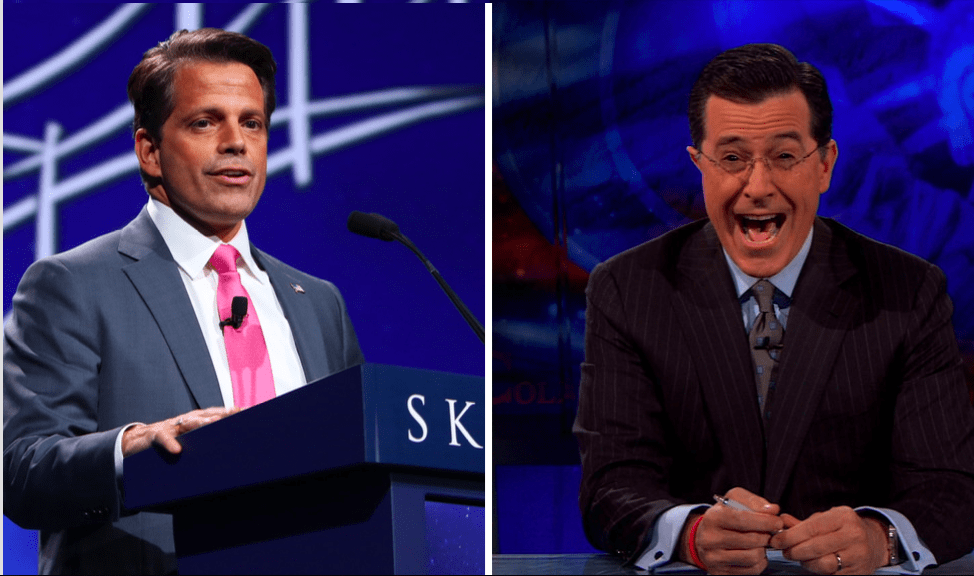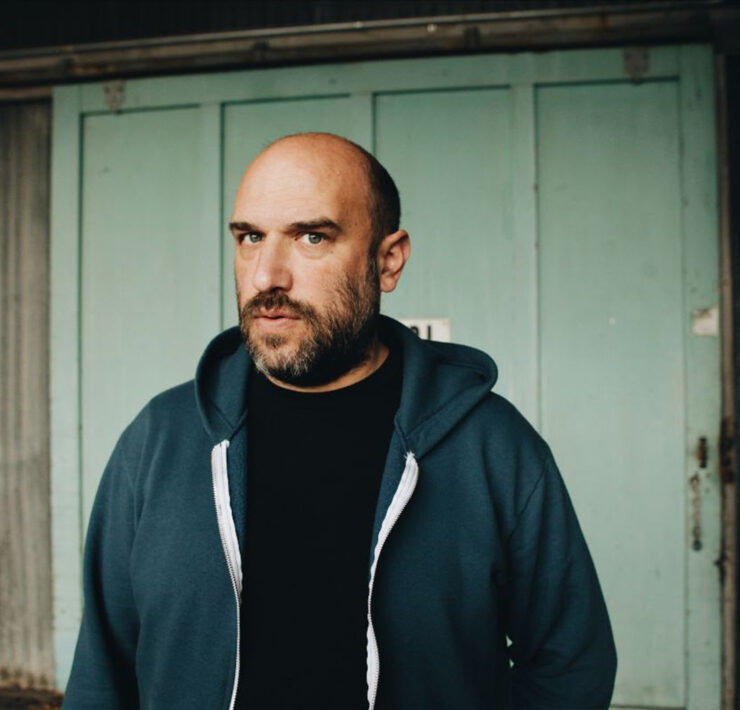
“If Pure Comedy was available in Christian bookstores, Christians would f***ing love me.”
When Josh Tillman says this of his latest Father John Misty album, he’s being 100 percent sincere. Granted, it’s a surprising take, given the album’s irreverent, cheeky and sometimes profane approach to asking hard questions about religion and faith. But Tillman is pretty sure Pure Comedy—the 13-song folk opus beloved by critics and his fiercely devoted fans alike—would find a real audience among the LifeWay set, if they ever gave it a chance.
“When I was making it and people were asking me what the deal was with my new album, I was like, ‘I think I made a gospel record,” he says. “I thought, I’m not sure anyone but Christians will be able to appreciate it … They’d go, ‘Thank God someone is asking these questions. Thank God someone is taking all of this to task.’ You know?”
Simple misunderstandings
Tillman’s home is at the end of a winding, tree-lined street in the Hollywood Hills. Looking around the quiet bungalow, it’s easy to see why he might be misunderstood by so many people. A record collection dominates the living room, but he doesn’t really listen to music. The art is eclectic and ironic. Bookcases are stuffed full of everything from eastern spirituality to the Bible. Even his name trips people up.
Tillman released a number of solo albums as J. Tillman over the first 10 years of his career. But since 2012, he has performed as Father John Misty, a name he calls “categorically silly … it makes me laugh every time I say it.”
Comedy is a big part of Father John Misty’s whole thing. His song lyrics are frequently funny; so funny you can miss their profundity. It’s a little contradiction in a persona full of them.
His music can be melancholy, but his live shows are full-out rock concerts. He’s known for making intellectual art, but regularly makes the roundson social media sarcastically trolling Justin Bieber, Taylor Swift and Ryan Adams.

If every single tic in Tillman’s personality doesn’t add up, well, it’s only because he’s not a man overly concerned with anything as asinine or soul-sucking as a coherent brand message. In real life, he’s thoughtful and animated. He’s a bookworm. He’s sly, too. You regularly get the sense he’s in on a joke that only he knows.
He has a lot to say, but as with a lot of musicians who attempt to tackle anything more complex than a broken heart, people misinterpret his message, or at least, his intent.
Those trying to nail down Pure Comedy are bound to get frustrated, because Tillman is not interested in things that can be easily nailed down. He likes to ask questions with no easy answers. But those questions, he insists, “still have value.”
Such an Intimate Thing
“Being someone who cannot get Christianity out of my system—I no longer even really want to—it’s an intimate thing to question God,” Tillman says.
There’s a song on Pure Comedy called “When the God of Love Returns There’ll Be Hell To Pay.” In the song, Jesus returns to earth, where he’s confronted by an angry, confused Josh Tillman looking at the state of things, singing, Jesus, you didn’t leave a whole lot for me / If this isn’t hell already, then tell me what the hell is?
It’s as good a picture as any of the sorts of questions Tillman asks.
“It’s like, ‘Yeah, OK, if when Christ comes back, you guys all want to be doing the same thing, I have some questions,’” he explains. “This is intimate.If this is truly my maker, and I have an audience with this guy in the way that Christianity claims I do, am I limited to a certain conversation? Are there talking points I have to run through or can I have an intimate conversation with my God?”
It’s a fair question, and the notion of having an intimate conversation with God is a recurring theme on Pure Comedy. But when you’re an acclaimed artist who’s headlined international tours, intimate conversations have a way of becoming public. 
“For all intents and purposes, I am a Christian, in that you cannot really get it out of your system,” he says. “It becomes your worldview … I had this realization that even if you become a fanatical anti-Christian, you’re still living in the orbit of these principles. It’s still a part of you.”
So Tillman still feels of the Christian culture, even if he’s not exactly in it. But for as much as he’s deeply familiar with the contours of Christianity as it’s most commonly expressed in the United States, he’s even more deeply troubled by it.
Complicated Roots
“I’ll do these little press videos where they’re like, ‘So tell us about your first concert,’” Tillman says recounting the rounds of interviews for outlets like Rolling Stone, The New York Times Magazine and MTV he’s done following an album release. “And I’m like, ‘I guess that would have been DC Talk. You want to hear about DC Talk?”
If this bit of Tillman’s backstory is not widely known, it’s only because he hasn’t always foun
d it easy to talk about his upbringing in the Church or the years he spent immersed in Christian sub-culture.
“I had this whole music career—or something resembling a career—in my 20s, and I did interviews,” he says, referencing his days as a solo artist and the drummer for the indie-folk band Fleet Foxes. “I didn’t go anywhere near Christianity, let alone referencing it so directly in my music.”
“I was terrified that someone was going to find out that I was a Christian,” he continues. “That I had grown up that way, that it was part of my life.”
He grew up in a devout family that attended church faithfully. Early on, he says his church leaders pegged him for a bit of a troublemaker, and that wasn’t necessarily seen as a bad thing.
“Rebels and freethinkers and the guys who were in trouble and stuff, they’re the ones who go on to be pastors,” he explains. “That’s the mold for the future pastor and something that I was sort of, in small ways, being groomed for.”
He delivered his first sermon at the age of 6. All through high school, he remained involved in ministry, even though the older he got, the more church culture—particularly the attitude of some leaders—began to rub him the wrong way.

“On one hand, a lot of it just has to do with a culture of the individual, with like the cult of the self, so these people who kind of refuse to integrate become leaders of this thing,” he says, remembering seeing other young Christians who were developing into ministry personalities. “I always found that very disconcerting, and I saw it when I went to Christian college. I saw it in full force. These kids who were on their way to becoming pastors and stuff. I found them very disturbing socially.”
To those raised in the Church, this may sound familiar. It’s true—a lot of the people who get groomed for church leadership are the same ones who start feeling a little unsettled about the whole affair. There can, at times, be a sense that you’re being drafted into a sport you’re not sure you want to play.
Sometimes, that can lead to an explosive split with the faith, in which you leave your religious tradition in a blaze of glory. That’s not Tillman’s story though. His is something more gradual and complex.
After attending Christian university Nyack College for a year, grappling with his faith and flirting with atheism, he moved to Seattle to attempt to get a music career going. It was there that he ended up moving into the basement of famed Christian music producer and Poor Old Lu band member Aaron Sprinkle, a man whose name would eventually become nearly synonymous with the Christian indie-rock label Tooth and Nail Records. Tillman even wrote band bios for the label to make a little extra cash.
He still has a fondness for the Christian bands he grew up listening to (Starflyer 59 is a personal favorite of his). “I was lucky t
o grow up in the kind of golden age of Christian rock,” he says. “It was amazing.”
Tillman recounts a story of being 20 years old and befriending Jesse Sprinkle—Aaron’s brother—a musician who was, at the time, playing drums for the Christian hardcore outfit Demon Hunter. Sprinkle got sick before the band’s first session, and they needed someone to take his place. Tillman ended up filling in. “I’m sitting there, and they’re like ‘Do you want to play drums on this?’” he remembers. “And I was like, ‘Yeah, of course!’ So now I have credits on that first Demon Hunter record … I love that that is one of my main credits.”
But while the Christian hardcore scene was fun, Tillman was struggling with other, more substantive parts of the culture he’d been raised in. After striking out to Seattle to pursue music, he wrestled not only with questions, but with how Christians tended to respond to his questions.
“The sick thing—and I use that word lightly—is that you grow up, and they tell you what to believe, and then, they have now integrated that moment into the program where they go, ‘Hey, by the way, your faith needs to be your own, and it can’t just be this thing that you’ve been told to believe your whole life,’” he says, sounding genuinely frustrated.
“Then you just go, ‘What the f***? You just pulled out the rug from under me! I’ve done everything you told me to do. I have not questioned this. I have believed it because it is the immutable cosmic truth of the universe apparently, because I have never been around anyone who did not claim that this was the truth. And now you’re telling me that all this time I’ve just been paying lip service to this thing, and now I need to find my own reason for …” he pauses.
And in that pause is the frustration of anyone who’s ever been disappointed when their spiritual leaders—who once seemed so easy and confident in their theological intellect—slowly reveal themselves to not be the all-knowing founts of wisdom you’d been led to believe.
“It’s a head f***,” says Tillman, finally. “It really is.”

Father John Misty Is Born
2012 changed everything for Tillman.
He had spent years building a solo career as J. Tillman before joining Fleet Foxes in 2008. When that union ended in a public and contentious manner, it could have been the end of Tillman’s music career.
But in 2012, he had a transformative experience in his professional—and spiritual—journey. “I took psychedelics for the first time,” he says. “That was a defining moment for me. I think in a lot of ways it was far more memorable than receiving Christ in my heart.”
The moment opened Tillman’s thinking, to put it mildly, and gave rise to an epiphany: He would make music with a mission.
“I made a decision five years ago that I wanted my music to be useful, and I wanted to be in service to people,” he explains. “And in order to do that, I was going to have to start communicating a lot more directly. My music couldn’t just be this aesthetic exercise.”
And in that moment, Father John Misty was born.
It’s worth clearing some things up about the name Father John Misty. Yes, it represents a transition in Tillman’s songwriting philosophy, but it’s not a different persona. Remember, Tillman chose the name mostly because he thought it was funny.
“I never liked the name Joshua, and I got tired of ‘J.’ It doesn’t matter what you call yourself,” he explains. “It was seriously born in a moment of, ‘You could call yourself Father John Misty,’ truly the silliest thing I could think of in a moment.”
But the adoption of the name represented a significant moment. It was a moment in which Tillman decided Father John Misty would help other people’s eyes be opened to the hypocrisies of the world and the truth behind the questions that had plagued him all his life.
The result was Fear Fun. Unlike his previous, J. Tillman-era albums, the debut Father John Misty release was a funny, high-energy riot that tackled big ideas between punchlines. It was an album about spiritual wandering, looking for truth while driving down the coast in a van filled with books and shrooms.
The record was a critical favorite and commercial success, and was followed up by 2015’s I Love You, Honeybear, a meditation on Tillman’s real life as a new husband, discovering the trappings, burdens and benefits of love and domesticated modern life. It’s a darker album than Fear Fun, taking aim at the American Dream with lines like, Oh, they gave me a useless education / And a subprime loan / On a craftsman home / Keep my prescriptions filled … Save me, President Jesus.
Back when Tillman was just releasing solo albums as J. Tillman, he would send his parents copies of each album he recorded. He went back to his family’s home one holiday and noticed his parent’s collection of CDs. He shuffled through them, finding his own still wrapped in cellophane, “untouched.”
“How can you not even be curious?” he says. “For a musician, that’s a pretty serious betrayal.”
He says his parents were disinterested in his art because they see it as “secular or kind of antagonistic to their worldview.” And his parents aren’t alone in that assessment of Tillman’s music, even as he evolved into Father John Misty, and particularly when it comes to his latest album.
 “I would give anything for people to see Pure Comedy the way that I intended or hoped people to see it,” he says. “It’s incredibly difficult.”
“I would give anything for people to see Pure Comedy the way that I intended or hoped people to see it,” he says. “It’s incredibly difficult.”
Pure Comedy is a sprawling, conceptual epic that starts at the birth of mankind and continues through mankind’s self-destruction at the hands of the technology, organized religion and the entertainment industrial complex. With something that unwieldy, it’s no wonder that not everyone’s on the same page about it.
Take the last lines of the title track. After unpacking all of the evils humans have unleashed upon itself in the search for meaning and security, Tillman sings, The only thing that seems to make them feel alive is the struggle to survive / But the only thing that they request is something to numb the pain with / Until there’s nothing human left / Just random matter suspended in the dark / I hate to say it, but each other’s all we got.
That may seem like a gloomy proclamation that veers into humanism if not outright nihilism, but, as Tillman explains it, “each other’s all we got” is actually about finding God, not abandoning Him: “I think what Christ was really about was that—we experience Him through other people.”
“When I say [in the song], ‘They worship themselves and yet they’re totally obsessed’ It’s like what is the point of Christ? What is the point of Jesus?” he says. “What is the point of all of this window dressing if you just worship yourself?”
“It becomes this empty f***ing exercise if you live in worship of yourselves,” he explains. “That’s the comedy of it.
“When I look at the person of Jesus, this guy who walked around speaking almost exclusively in ironies, the best parts of what Jesus had to say were ironic,” he says. “That the first shall be last and the last shall be first. When I am writing a song like ‘Pure Comedy,’ I’m thinking about the fact you have this guy that was despised by the religious order of his day and who was there to take the world … Everybody is going, ‘These institutions don’t work.’ It’s got to be personal.”
Pure Comedy was written before the 2016 election, but even so, the record feels politically timely. It takes on broken political institutions, especially in light of the teachings of Christ. “Running countries was not part of the deal,” he says of Christianity. “And there is so much more power in absolving oneself of power. That is the Gospel. That is the Beatitudes. Like, ‘Powerful are the people who have no power.’ If you absolve yourself of that, then that, to me, is faith.”
And by that reckoning, he says, Pure Comedy may have just as many “Christian” merits as a “Christian” album.
“Those kind of fundamental questions are enough for a lifetime, I think,” he says. “Show me a more sophisticated question. And again that is the pure comedy of the album. The answers haven’t become more sophisticated. That’s an illusion. The questions are the same as they’ve always been.”
Still Asking
After spending the afternoon at his home, Tillman heads to the studio where he’s already wrapping up Pure Comedy’s follow-up, due out next year. He says he views the first three Father John Misty albums as a sort of informal trilogy, but there’s likely at least one theme that will carry through to the next one: lyrics that ask questions.
Though he’s evolved in his own faith journey, Tillman says he still isn’t exactly sure what it means to truly experience Jesus. But he really wants to know. He grew up in the Church, but that supernatural feeling that takes Christianity from an intellectual pursuit, a moral challenge and a social force for change into a life-altering, real experience, remains elusive.
He recalls a conversation he once had with his father—a man who was saved as a middle-schooler and has been a devout Christian ever since. He started asking his dad about people of other religions who are just as self-assured in their beliefs as any faithful Christian. “I’m just like, so everybody got it wrong before you?”
Tillman asked about biblical genealogies that don’t line up with other historical records, and parts within the biblical narrative that seem to contradict each other, no matter how nimble your hermeneutical acrobatics.
His father’s response was, in essence, to ask, “So what?”
“I like that my dad’s answer is that he doesn’t know and that he doesn’t care,” Tillman says. “I like that. Because that I can understand. Because that’s actually the only reasonable response.”
Rather than relying on apologetics or Ray Comfort-style logic-based evangelism, the faith of Tillman’s father is based on an encounter he had with Jesus.
“When you look at all of it, the only response that I respect is that Christ did something in my life and it means something to me,” he says. “That’s the only answer that I can really respect. Everything else to me is f***ing Kirk Cameron bulls***. It’s all just the wisdom of man, and man’s wisdom is bulls***.”
Maybe that’s why Tillman can’t stop asking questions. He’s not exactly looking for answers, and he’s certainly not looking for the wisdom of man. Through his art—and even drugs—he’s just looking for an encounter, and will keep questioning God until he gets one that adds up to the experience he was promised when he was younger.
At the end of the day, Tillman doesn’t have an issue with Christianity, or even an issue with God. He still hasn’t experienced the encounter others have or that he’s looking for, but he does believe it’s real.
“Christ just never did anything in my life,” he says. “It just didn’t work that way. I only mean that in the very remedial sense. I said the words and I didn’t feel anything.”
His issue—the reason he is now making music—is that he wants to show others the dangers of getting it wrong. He’s holding true to the idea he had back in 2012 when he tried mushrooms and decided to serve and be useful.
Tillman tells the story of working at a friend’s family business installing acoustic paneling. His friend’s father ran the business and was a devout Jehovah’s Witness, but the son was being exiled from the religion. They worked together, but that was the extent of their relationship.
“He worked with his dad, day in and day out,” he recounts. “They never saw each other outside of work. They barely spoke at work … He never went home. They never spoke. That, to me, is a derangement of the natural order of things.”
Anyone who’s spent any amount of time around a community of any religious persuasion has probably heard a similar story, or even been part of that story themselves. It’s what happens when religion gets twisted.
It’s something Tillman has seen firsthand and, according to him, it’s the sort of religion that needs to be questioned. Maybe Tillman, by standing just outside of the thing, is in a better place to question it than most.
“I think the reason a lot of musicians have trouble staying with the Church is because music is all about harmony, literally and figuratively” he says. “It’s about looking for these harmonic strains that run through the human experience and these points where everything converges. And I think Christianity, at least for me, demanded that I look at what I saw as being inconsistencies and just live with them. But I love duality. Duality is at the heart of music. It’s at the heart of my life.”
And if dualism may seem to lead to some intellectual contradiction, Tillman says, well, what is faith if not learning to embrace paradox?
“Isn’t that part of the deal?” he says. “Isn’t that part of humility? Isn’t part of Christianity being able to ask, ‘How could I possibly expect the world to understand me?’ That’s the humming dynamo at the center of Christianity to me.”
“But now we’re living in this world where in order for this stuff to be true it all has to be factual. You have to be able to look at the water levels of the Grand Canyon and chart out where the flood of Gilgamesh happened and all this stuff. And I’m thinking, ‘OK, where’s the faith? What role does faith have in this?”
 All music
All music
“I think you’re going to be hard pressed to find any musician who doesn’t have some vested interest in spirituality and matters of the heart,” Tillman says. “I just see those as being like part and parcel with Christ or whatever. It is all about sin and redemption. All music.”
And so this is what it comes down to for Tillman. He’s asking big questions, but he’s not trying to be antagonistic. He’s not exactly in the Christian culture, but he is of it, and he wants to broaden its scope—to force it to face the sort of issues he never felt like he got permission to grapple with when he was younger. He’s looking to widen the tent.
“If the Church says, ‘OK, maybe these things that are happening out in the broader world—maybe Christ is in that too,’ then maybe the world’s market can be our market,” Tillman says.
And if Tillman can get the Church interested in the sorts of questions he thinks it should be asking then, who knows, maybe they’ll start selling his album in Christian bookstores.








 All music
All music













